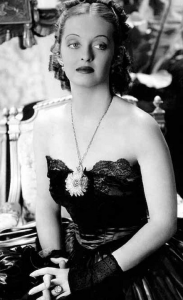
By Maggie Pool
Ruth Elizabeth “Bette” Davis was an American actress on film, television, and theater. With a career spanning over 60 years, Davis is known as one of the greatest actresses in Hollywood history, but she didn’t start off that way. Davis’s first few roles flopped at the box office, and the film executives in charge of her were left wondering what to do. Due to what they considered her “unconventional” beauty, Davis was put into a different box compared to most female Hollywood stars. However, her fierceness, boldness, and unwillingness to give in to “the man” led to her victory against the misogynistic moguls running Hollywood. Eventually, Davis’s talent was realized, harnessed, and triumphantly executed.
During her first audition in Hollywood, Davis arrived at Universal Studios with no one waiting to greet her. It was later found out, a studio employee waited for her but left because he didn’t see anyone that “looked like an actress.” Davis was casted in minor roles, all of which didn’t exploit her abilities because she didn’t fit Universal’s beauty standards. After a year, and six unsuccessful movies, Universal chose not to renew her contract.
Davis’s luck changed. Warner Brother’s film maker, George Arliss chose Davis to lead in the Warner Brothers picture, The Man Who Played God (1932). Warner Bros. He signed her to a five-year contract and remained at the studio for the next 18 years. In 1934, Better Davis was loaned out to RKO Pictures to star in Of Human Bondage. Her role garnered so much praise from critics it eventually led to an uproar when she wasn’t nominated for an Academy Award. Due to the circumstances, the Academy president said, “any voter… may write on the ballot his or her personal choice for the winners.”
This was the only time in Academy history where a candidate not officially nominated was considered for the award. Davis followed up Of Human Bondage with another next breakout role in the movie, Dangerous (1935). A reviewer from Picture Post wrote, “I think Bette Davis would probably have been burned as a witch if she had lived two or three hundred years ago. She gives the curious feeling of being charged with power which can find no ordinary outlet.” *This wasn’t just an issue with Davis.
All the praise in the world could not sway President of Warner Brothers, Jack Warner. For years, Bette Davis insisted on bigger and better roles, but Warner always rejected her pleas*. Due to her displeasure, Davis filed a lawsuit in 1937 against Warner and sought to move to England after being offered two movie deals better suited to her talents, even though this would be in direct violation of her contract. She later admitted in an interview, “I knew that only directors and good scripts could give me a career, I couldn’t do it with the junk.”
Davis lost the lawsuit, but won the war. She began to get parts she yearned for and what movie lovers will remember forever. For five years in a row, Bette Davis was nominated for an Academy Award for Best Actress for her roles in Jezebel (1938)**, Dark Victory (1939), The Letter (1940), The Little Foxes (1941), and Now, Voyager (1942). In a 1988 interview, Davis asserted, “unlike many of her fellow actresses, she had forged a career without the benefit of beauty.” She admitted to being terrified during the beginning of her career, but became tough by necessity. In the end, her unruly toughness won her one of the most memorable performance careers in Hollywood history.